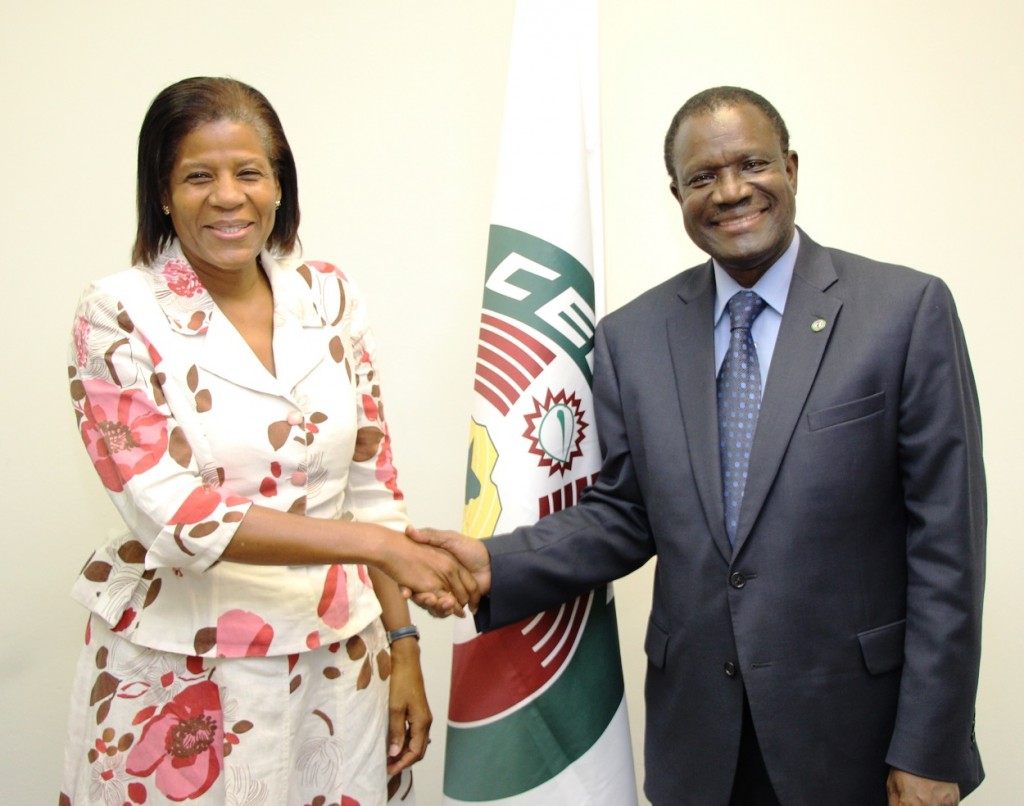Nigeria World Bank Country Representative Pays Tributes To ECOWAS
 The outgoing World Bank Country Representative to Nigeria, Marie Francoise Marie-Nelly has paid glowing tributes to ECOWAS for the sustenance of the integration momentum as well as the collaborative initiatives between it and the global finance institution.
The outgoing World Bank Country Representative to Nigeria, Marie Francoise Marie-Nelly has paid glowing tributes to ECOWAS for the sustenance of the integration momentum as well as the collaborative initiatives between it and the global finance institution.
The Country Representative who met with the President of the ECOWAS Commission, H E Kadré Désiré Ouédraogo on the 18th of June 2015 in Abuja expressed delight at the commencement of ECOWAS Common External Tariff (CET) initiative as well as the progress being made on the Economic Partnership Agreement with the European Union (EU).
She said that the purpose of her visit was to bid the ECOWAS President farewell as her mission in Nigeria comes to an end. The World Bank and ECOWAS She said, have developed a very strong relationship and partnership that is supported by a matrix of action on important areas where they have decided to work together, such as trade and integration.
Speaking further on the benefits of the ECOWAS-World Bank cooperation, Marie-Nelly noted that her bank and ECOWAS are very much engaged in developing agriculture stressing that she is pleased with the outcome reached so far as there is an understanding that the World Bank will be engaged actively in Member states and at the regional level.
Identifying agriculture as an important area of cooperation, she said fertilizer and seedlings development are areas where some level of achievements have been recorded that can facilitate trade within the region. The West African Power Pool is expected to lend support in this regard. Liberia and Cote d’Ivoire are the most recent examples where this cooperation is already bearing fruits. The belief according to the World Bank Chief is that, with the network is in place, both sides are looking at working to ensure that the Power companies are strong and capable of supporting trade.
The Country Representative made more disclosures on both the financial and technical side of her bank’s contributions to the ECOWAS integration enterprise stressing that the bank is working with both states as national entities as well as at the regional level with the latter already being granted an allocation of about $2.5 billion.
Interpreting that figure as quite significant, she disclosed that a large part of it is meant to support infrastructure projects such as the Abidjan-Lagos corridor. The World Bank she continued, is not just about financing but also about the provision of significant technical support.
The World Bank and ECOWAS have also been working closely on Ebola control while providing support in new areas such as education and the raising of Centres of Excellence at the regional level. So far, about ten countries are participating in the programme that is expected to really help create the capacity that will bring integration efforts in West Africa to the next level.
Speaking more on her Bank’s goodwill towards ECOWAS as the body marks its 40th anniversary she went into memory lane disclosing that she was the officer that started the development of regional integration in the World Bank for Sub-Saharan Africa. She noted that this pioneering effort gave birth to today’s synergy between the World Bank and ECOWAS.
The World Bank chief added that with the free movement of people, CET and a Common Custom Union in place at a time we are looking at global value chains, She said it is important for the West African region to compete in the global market.
President Ouédraogo thanked the outgoing World Bank Country Rep to Nigeria for her farewell visit maintaining that it afforded him the opportunity to express the Commission’s heartfelt gratitude to the Bank for the excellent cooperation that exists between it and ECOWAS.
He commended the personal involvement of Marie-Nelly in the promotion of cooperation in West Africa through her pet project- the annual dialogue between the regional groupings in member states meant to promote regional projects and under her watch, the Bank had remained fully engaged in sectors like energy, infrastructure, air transport, agriculture, education as well as the implementation of the Sahel strategy.



